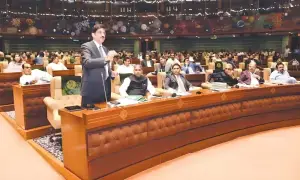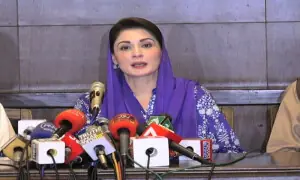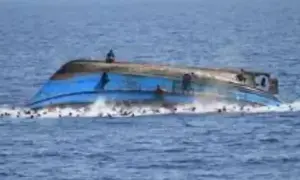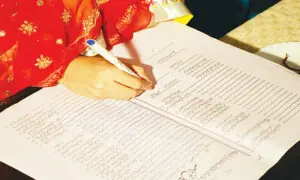Pakistan hasn't rejected India's Siachen demilitarisation proposal
5 min readPakistan on Friday said it has not outrightly rejected India’s recent proposal about the possibility of the demilitarisation of the Siachen Glacier.
In a weekly press briefing by Foreign Office Spokesperson Asim Iftikhar Ahmad, was asked to respond to New Delhi’s proposal on the issue.
The proposal came from Indian Army chief General Manoj Mukund Naravane who said that India was not averse to the possible demilitarisation of the Siachen glacier provided Pakistan accepted the 110-km Actual Ground Position Line (AGPL) that separates Indian and Pakistani positions, reported Hindustan Times.
“On multiple occasions, the prime minister and the foreign minister have expressed our position on this matter (dialogue)," the FO spokesperson said. "But India has vitiated the environment — the conditions are not there. We have repeatedly said that onus lies on India to take necessary steps for an environment conducive for constructive dialogue.”
The FO spokesperson noted the country had a policy, which is derived from the principle of a friendly neighbourhood and that Islamabad wanted peace and friendship in the neighbourhood, good relations with all including India.
“But you have seen how the developments have unfolded in our region. You have witnessed the very hostile Indian attitude especially during the last couple of years and since the illegal and unilateral actions of August 5, 2019 in Indian occupied Kashmir,” he said, adding the situation had further deteriorated and in this context, Pakistan had to see how it could move forward.
In his opening statement, he said Pakistan condemned the increasing harassment, illegal arrests and registration of fake criminal cases against journalists and civil society activists in Indian occupired Kashmir.
“The attack and ban on Kashmir Press Club manifestly reflects India’s entrenched use of brute force and coercion to forcibly silence all those raising voices against its horrendous crimes and genocidal acts in the region,” he added.
The International Federation of Journalists in a press release issued on Thursday condemned the forcible closure of the KPC, the largest independent media body in Indian occupied Kashmir, in a raid by armed police saying “The IFJ and its Indian affiliate, the Indian Journalists Union IJU, condemn the undemocratic closure of the organisation and the Indian administration’s continued stifling of press freedom in the region.”
Ahmad said it was encouraging that the international community was increasingly realizing the gravity of the situation in Indian occupied Kashmir which Pakistan had been drawing attention all these years.
“You would have followed example the Russell Tribunal on Kashmir held in Sarajevo last month, and the filing earlier this week of an application by a London-based law firm with the British Police seeking the arrest of Indian officials over their alleged role in war crimes in IIOJ&K,” he pointed out.
Stoke White had filed an application with the British police seeking the arrest of India’s army chief and home minister over their roles in war crimes in Indian occupied Kashmir.
The law firm submitted extensive evidence to the Metropolitan Police’s War Crimes Unit documenting how Indian troops headed by General Naravane and Home Affairs Minister Amit Shah were responsible for the torture, kidnapping and killing of activists, journalists and civilians. The law firm’s report which was based on over 2,000 testimonies taken between 2020 and 2021 also accused eight unnamed senior Indian military officials of direct involvement in war crimes and torture in IoK.
“It is self-evident that India can no longer escape international and legal censure for its rampant human rights violations in the region, and we call upon the international community, particularly the United Nations and international human rights and humanitarian organisations to hold India accountable”, said the spokesperson.
He noted that more action should be needed across the world as the current status of reaction was not enough and that lead the Pakistan to continuously raise its voice and mobilise international opinion and support for the Kashmiri people.
Afghanistan crisis
In the briefing, the spokesperson also talked about Pakistan’s latest position on the Indian request to send wheat assistance to Afghanistan through the land route of the Wagah Border.
“As you would recall Pakistan has allowed [it] on humanitarian grounds on an exceptional basis. We have conveyed to the Indian side, necessary details of arrangements put in place by Pakistan,” he said, adding, Islamabad was awaiting further response from India about the date of dispatch and other information regarding the first consignment, for about 3 weeks now.
Issue of Pakistani students studying in China
Ahmad also talked about the problems of stranded Pakistani students who were unable to return to China to continue their studies. “The issue has been discussed between both countries on several occasions,” he said, adding a list of 492 students has been shared with the Chinese Embassy with the request to treat them as a priority for return to China, reported The News.
“It has been raised by the prime minister, the foreign minister, the foreign secretary and the respective embassies. Federal Minister for Education and Professional Training Shafqat Mahmood raised the issue with the Chinese ambassador in September and pursuant to that meeting, the Ministry of Education designated the Higher Education Commission as the lead organisation and nominated focal persons from HEC and Ministry of Education to work in coordination with the Chinese embassy,” he explained, according to the report.
Quoting Ahmad, it added that China’s policy was not country-specific but it uniformly applied to all international students according to the Covid-19 situation in their countries. “Chinese authorities have been extremely cautious since the outbreak of new variants,” he added.
The FO spokesperson further said the students from any South Asian country had not returned to China so far. “We understand China is undertaking a comprehensive review of policy on students’ return that is expected to be completed soon. Students from Pakistan will be prioritised whenever a decision is made for a phased and gradual return of international students to China,” he added.
It is pertinent to mention that a viral video on social media received heavy criticism by netizens in which Foreign Minister Shah Mahmood Qureshi encountered the stranded Pakistani students who were unable to return to China for the last two years and requested the former to make arrangements for their return. However, FM Qureshi justified the Chinese policy, saying they would had to remain in Pakistan for the next two years if the Covid-19 situation remained the same.
For the latest news, follow us on Twitter @Aaj_Urdu. We are also on Facebook, Instagram and YouTube.






















Comments are closed on this story.